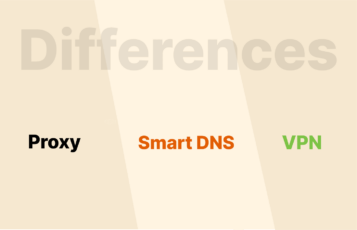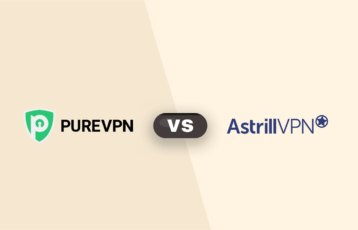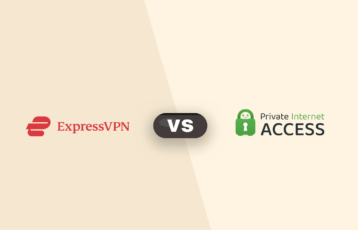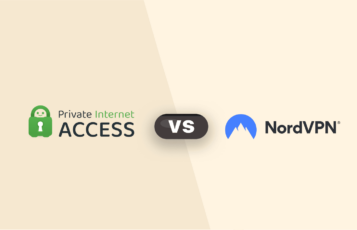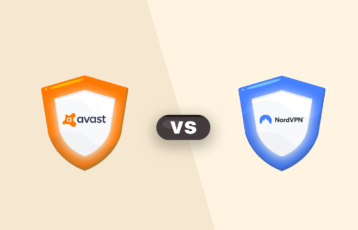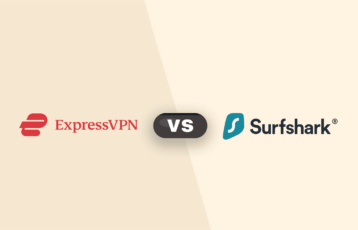NordVPN, without a doubt, is one of the leading VPN services that offers optimum privacy, helps you bypass geo-restrictions and censorship, and gives you full authority over how you consume the internet.
The VPN also has an in-house developed WireGuard-based VPN protocol, NordLynx, that doesn’t let you compromise on the speeds. However, there may still be one reason or the other that you might want to consider a NordVPN alternative.
For example, NordVPN is only affordable and within budget if you choose its long-term plan (a 2-year plan costing $3.09 monthly). However, if you are looking for a VPN for a limited time, it could prove a bit expensive. There are some other options that offer top-notch privacy and security, and are tested to be. as good as NordVPN (to a greater extent). This article lists those top alternatives to NordVPN.
Top NordVPN alternatives – Quick list
- ExpressVPN: Top-tier VPN known for blazing fast speeds, advanced security, and wide server coverage.
- Surfshark: Budget-friendly service with unlimited device connections and strong privacy features.
- Private Internet Access: Highly customizable VPN offering robust security and a massive server network.
- Proton VPN: Privacy-first VPN backed by ProtonMail, with strong encryption and a free plan.
- Total VPN: Simple VPN solution offering basic protection and easy-to-use apps for beginners.
Top-notch VPNs like NordVPN – Detailed list
1. ExpressVPN

A leading VPN service that offers full-proof security and blazing-fast speeds across almost all of its server locations on offer.
Pros
- Has almost same features as NordVPN
- Allows P2P sharing
- Advanced security and privacy features
Cons
- Slightly costly
ExpressVPN is a convenient option (and the best overall NordVPN substitute) for beginners because of its simplicity, speed, and performance. It has maintained its top provider status for many years because of its excellent user experience and transparency.
ExpressVPN offers apps for almost every device available, including Windows, macOS, Android, and iOS. Moreover, the service has recently introduced a new GUI app for Linux. It allows you to connect up to eight devices at once.
Another important attraction of ExpressVPN is its proprietary Lightway Turbo protocol, which focuses on speed and reliability. The service is fast enough for all high-bandwidth activities, including 4K streaming, gaming, torrenting, and video calls.
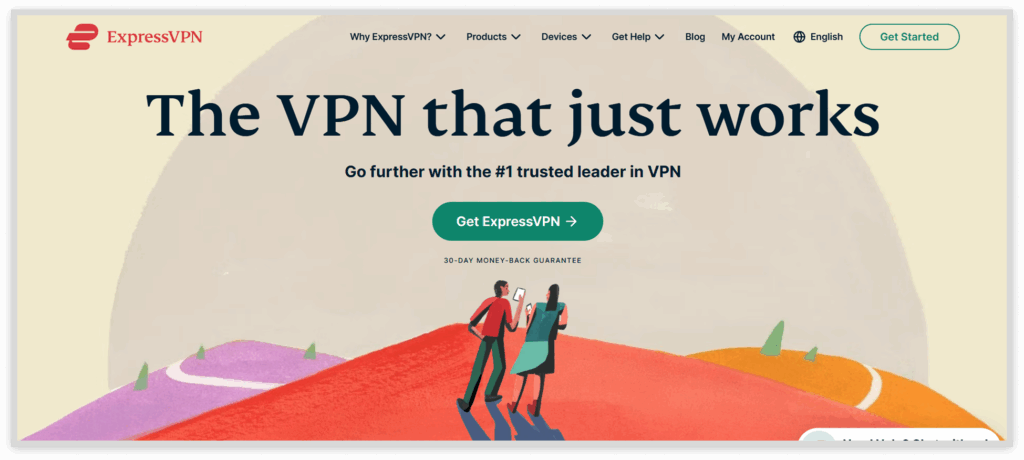
More importantly, unlike any other service on this list, ExpressVPN prides itself on transparency and has undergone a staggering 23 independent audits since 2018.
It’s a no log VPN service. With a track record of being repeatedly verified by 3rd-party independent auditors, ExpressVPN is as good as it gets when it comes to privacy claims that are not just marketing, but a part of its value proposition, exemplified in top-notch operational efficiency.
Price is a key factor (remember most people look for NordVPN alternatives due to not willing to commit to long-term plans). It’s worth noting that with all these premium features and full-proof security, you can subscribe to ExpressVPN for $3.49 for a 2-year plan.
2. Surfshark

Among the most suitable VPN services for users who are on a budget. It offers an impressive list of premium features and unlimited device connection support at a low cost.
Pros
- Simple and user-friendly interface
- An effective Camouflage mode
- A responsive customer support available 24/7
Cons
- Isn’t effective as NordVPN
Surfshark has quickly gained a strong customer base by providing great and privacy-friendly features at a really cheap price. The most amazing part about Surfshark is that it allows unlimited simultaneous connections on a single account, which only a few providers offer.
The has a built-in ad and malware blocker. Plus, it includes a kill switch to make sure that nothing will ever mistakenly expose your real IP address if your internet connection drops. It has a huge server network, with 3,200+ servers in 100 countries.
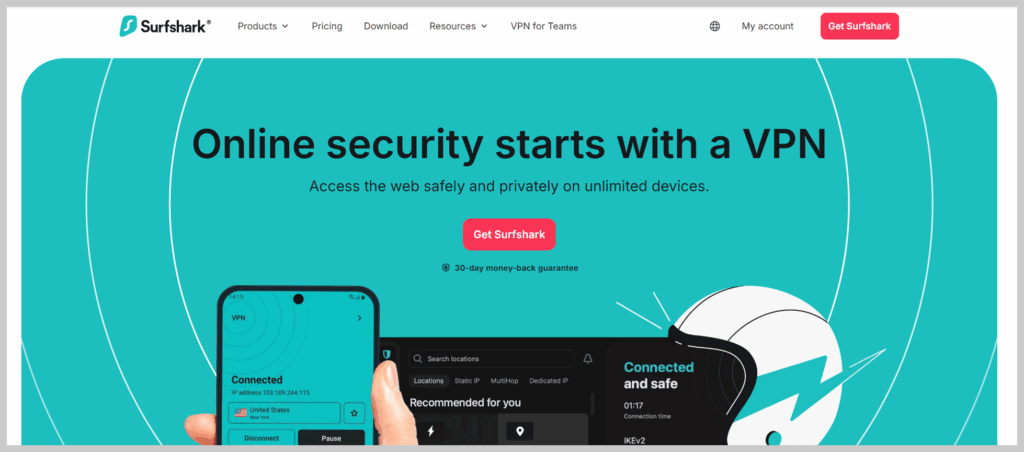
However, users must remember that the VPN service is based in the Netherlands, a member of the Nine Eyes.
This surely is concerning for privacy-oriented users. However, the service usually goes through independent audits and claims a proven no-log policy and serves as a strong counterpoint.
While some tests indicate (which we conducted during our research) that NordVPN outperforms Surfshark. The speed loss when using Surfshark is very limited, with internet speeds dropping by less than 10% on most servers.
For most use cases, it is more than enough performance-wise, and it provides reliable support for streaming services like Netflix. Surfshark is also much cheaper with their long-term plan starting at $1.99 per month, making it a valid and strong competitor.
3. Private Internet Access (PIA)
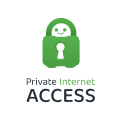
Another famous VPN service that provides smooth and safe access to the online without hassle.
Pros
- Effective malware and ad blocker
- Has decent features
- Dedicated apps for all major platforms
Cons
- Inconsistent speeds
Private Internet Access (PIA) is one of the most reputable and well-established VPNs today. Known and loved for its low price, it has a huge server network and extensive customization options.
PIA has always been one of the cheapest VPNs (if not the cheapest VPN) you can find, with its three-year plan costing around $2.03 a month. Considering what you’re getting for affordable fees: top features on basic plans, it’s a great deal.
While the service has a large pool of servers, some servers may have slow speeds (the far ones), preventing you from unblocking and streaming your favorite content from abroad
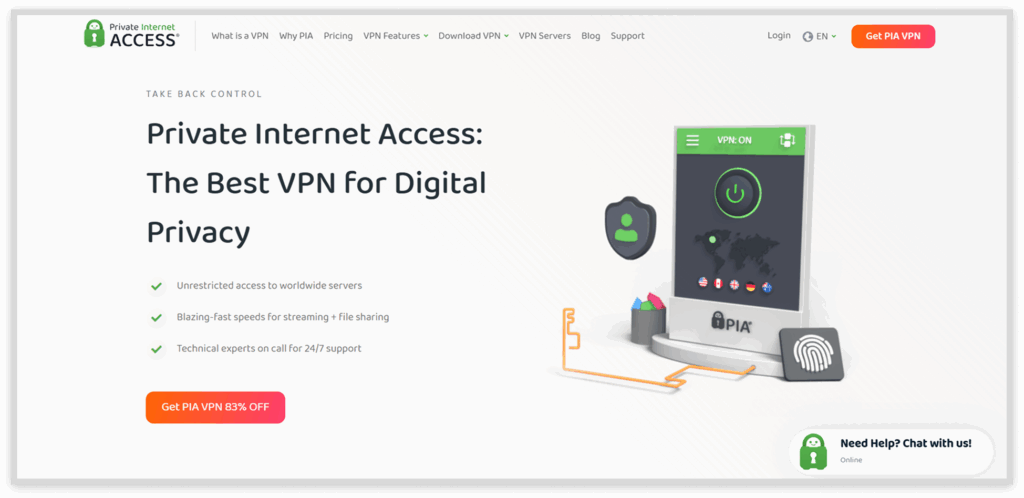
PIA also supports unlimited simultaneous connections, a kill switch to stop data leaks, and has a MACE (malware and tracker block) ad-blocker built in.
Despite being based in the US, a member of the Five Eyes alliance, the service has an audited and proven no-log policy.
However, PIA’s main weakness is its speed. During our testing, we experienced a median speed loss of 48%. That said, we do see that PIA is working to improve its speed by upgrading to 10G servers, perhaps after considering past Gigabit speed concerns of its users.
4. Proton VPN

A Swiss-based safe VPN that has a strict no-logs policy and full-disk encrypted servers, and offers a free VPN version.
Pros
- Fast speed connectivity with VPN accelerator
- Open-source applications
- Offers a free plan
Cons
- Limited features on free version
Developed by the founders of Proton Mail, Proton VPN is one of the handful of privacy-first services that offer impressive features for both free one premium users.
It is an excellent choice for anyone whose main concern is security and transparency. Plus point, you can have access to all Proton services, including Proton Mail and Proton Drive, by purchasing only the Proton VPN service.
Proton VPN’s free plan is really unique, given that most free VPNs sell user data or bombard you with advertisements, but Proton VPN’s free option has no monthly usage limits and is completely free of ads. If you’re looking for free alternatives to NordVPN, Proton VPN is for you.
Its paid version has extra features, including multi-hop connections, the ability to connect through Tor on the VPN, and a “Stealth” feature.
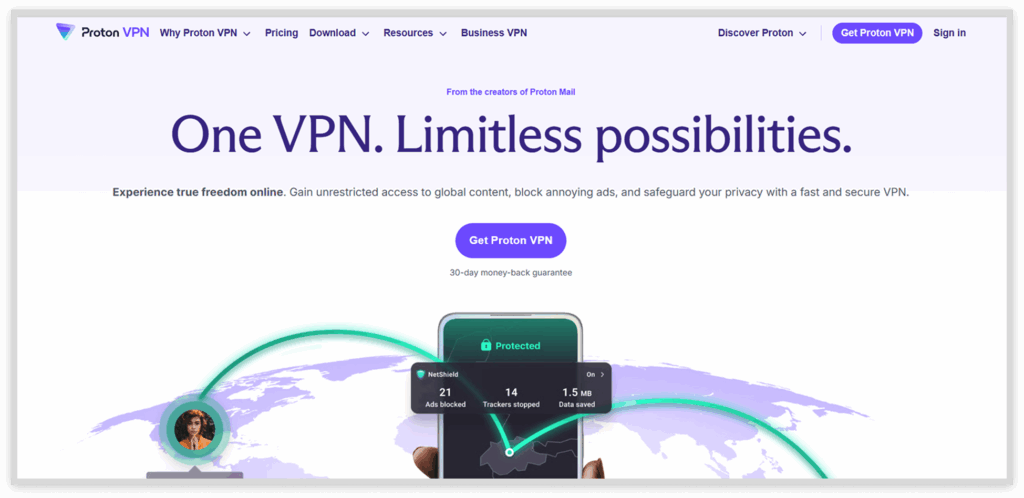
Proton VPN ranks highly when it comes to privacy and security, as it is based in Switzerland – a country with some of the strongest privacy laws in the world. All of its apps are open-source and accessible for public review, and it undergoes independent audits regularly.
They also utilize RAM-only servers, which delete all session data on reboot, and this greatly enhances the user’s privacy.
With just a 16% average speed loss, Proton VPN performed impressively well as it ranked among the fastest VPNs we tested. While it may not be the speed leader by the smallest degree (NordVPN had a loss of only 3%, the best in our testing), it was fast enough for any activity online.
5. Total VPN

A simple but decently effective VPN service that has basic features and decent speed.
Pros
- Affordable plans
- Easy-to-use apps
- Advanced DNS leak protection
Cons
- Does not offer P2P-friendly servers
Total VPN is unique among the alternatives in this guide in that it comes mostly as a feature of the full TotalAV antivirus suite instead of as a stand-alone product. This includes an effective VPN, ad-blocker, and powerful antivirus and malware protection powered by Avira.
The service has several protocols to use, including WireGuard and OpenVPN, and it supports 5 device connections at a time. At $1.59 per month, the price is unbelievably cheap for the consumer who is already paying for a suitable antivirus and ad-blocker.
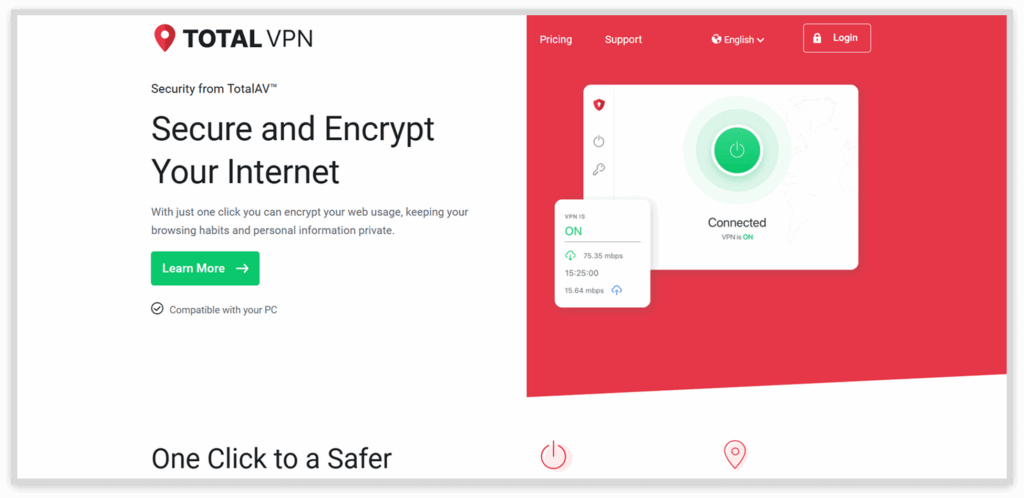
However, Total VPN’s no-logs policy is “unclear and vague” and states that there is a possibility of some IP information being logged, which is a major concern. They are also based in the UK, which is part of the Five Eyes intelligence, enabling the government to request any log data from companies within the UK as a legal jurisdiction.
The overall problem is that the all-in-one security suite may present a false sense of security. The bundle protects everyone from malware, but they don’t have the same privacy features as others on the list.
It has decent speed to do basic tasks online, but not as fast as NordVPN. The product value lies with the bundle altogether.
Best alternatives to NordVPN: Comparison table
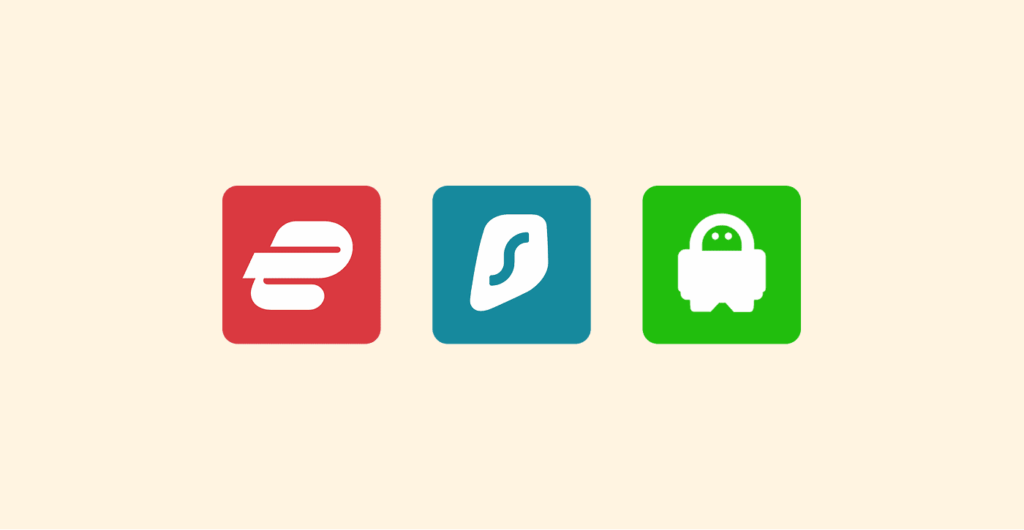
| VPN name | Best for | Starting price | Standout feature |
|---|---|---|---|
| ExpressVPN | Overall ease of use & streaming | $3.49/mo | Lightway Turbo protocol |
| Surfshark | Best value & unlimited connections | $1.99/mo | Unlimited simultaneous connections |
| Private Internet Access (PIA) | Maximum customization on a budget | $2.03/mo | Massive server network |
| Proton VPN | Best all-around value & Free Plan | $4.99/mo | Best-in-class free version |
| Total VPN | Bundled security solution | $1.59/mo | Built-in antivirus & ad-blocker |
Choosing your armor: Essential factors to consider in a VPN
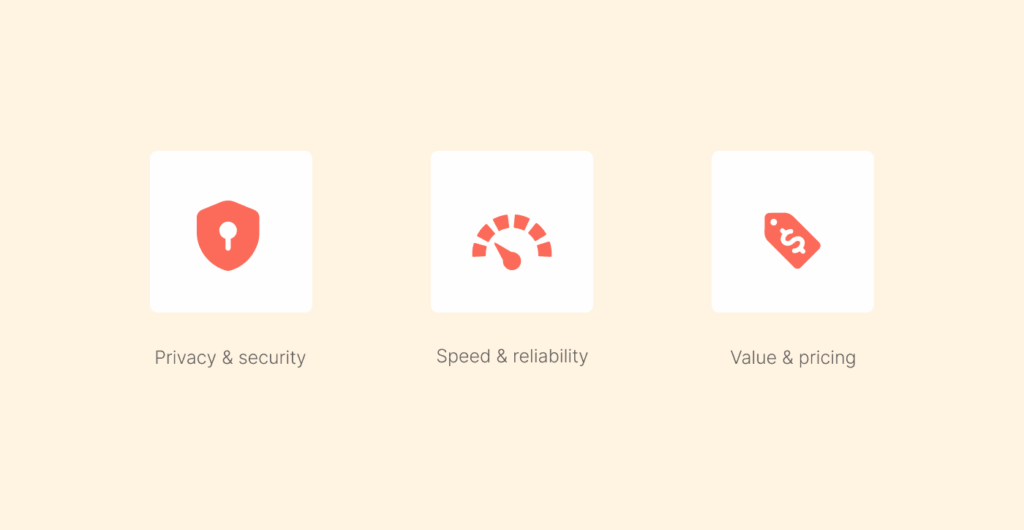
Here are some of the essential things you must consider in a privacy-friendly VPN service:
Privacy & security
A no-log policy is indeed the top aspect of a premium and secure VPN. We recommend that you consider a VPN that has had its claims independently audited by a thorough, independent, and reputable auditor.
Our research with Private Internet Access showed that a strong, court-adjudicated audit is a better indication of your privacy than just a “safe” jurisdiction. You must use a VPN that connects with a strong, up-to-date encryption, like Advanced Encryption Standard (AES) encryption at 256 bits.
It is even more worthwhile to find VPNs that have the latest protocols, like WireGuard, or their own protocols with a good reputation, like ExpressVPN has Lightway Turbo or NordVPN using NordLynx, which may balance speed vs. security.
Another key feature is a kill switch that cuts off the internet connection when your VPN drops unexpectedly. As a safety safeguard, we recommend using multi-factor authentication on your VPN account itself to prevent unwanted access.
Speed & reliability
Select a VPN with a wide server coverage area to minimize traffic and maximize your chances of finding a fast and reliable connection.
Speed will depend on your distance to a server and what protocol you use, so we recommend using the VPN’s free trial before going for the long-term plan. You can also request a refund, as all the services mentioned on this list have a 30-day money-back guarantee.
Usability & support
When choosing a VPN, an uncomplicated, simple-to-use interface will be very helpful – especially for novice users. An app that is simple to use with a clear connect button can help transition you from a frustrating VPN experience to an easy one. Also, look for a provider that offers great support, like 24/7 live chat.
NordVPN vs. ExpressVPN: Which one is best?
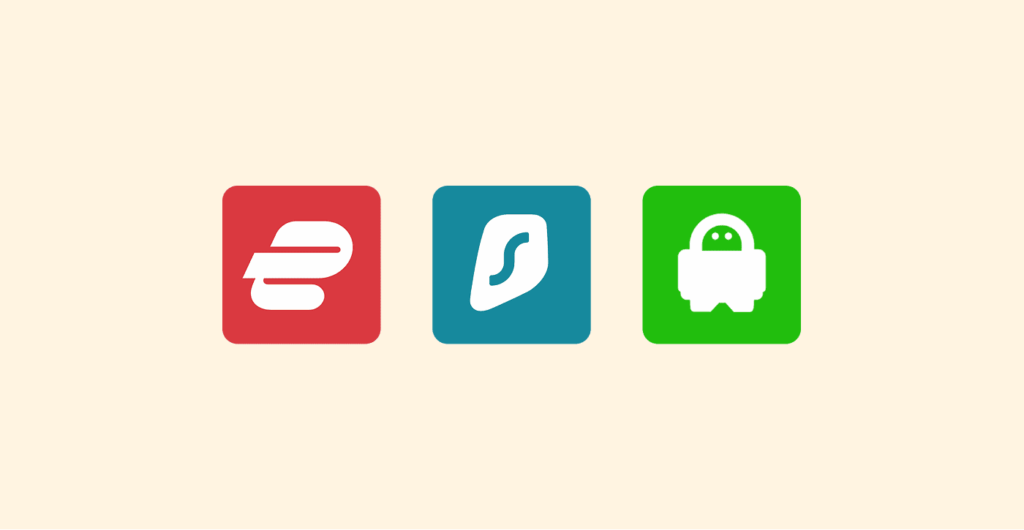
These two giants have been fighting it out in the VPN market for years. While both are good services, their differences are really in approach and which users they are speaking to.
A thorough comparison will show the subtle differences.
- Price: ExpressVPN’s annual plan is a bit expensive (3.49/month) than NordVPN’s (approximately $3.09). Thus, in pure cost terms, NordVPN wins with just a little margin.
- Performance: Both services are super-fast, but they have pursued different routes to grow their speeds.
ExpressVPN’s proprietary Lightway Turbo protocol is super-fast, and its average speed drop is 18%. Also, NordVPN is known for its NordLynx protocol, which has proven to always deliver fast speeds across all locations.
Both are fast enough for any online activities, but NordVPN leads by ensuring only a speed drop of 3% as against Express VPN’s at 18%.
- Privacy & security: Both services have good records in their commitment to transparency. ExpressVPN operates from the British Virgin Islands and has a perfect audit record since 2018, with 23 independent audits. NordVPN operates from Panama, which is also a privacy-friendly and uses RAM-only servers set to wipe data when rebooted.
- Connections & features: NordVPN allows for 10 simultaneous connections, while ExpressVPN is limited to 8 connections. NordVPN also has more servers, more specialized servers, and a security suite that includes an ad-blocker, antivirus, and password manager.
A perfect option for beginners, ExpressVPN is known for its simplicity and consistent and polished experience across all its applications.
Our final decision: NordVPN is the better option for those needing an all-in-one cybersecurity solution that bundles multiple types of protection.
So, what is the best NordVPN alternative?

From our thorough analysis, we are in a position to provide a solid recommendation, as well as recommendations for specific use cases.
- Best overall: ExpressVPN: ExpressVPN is the best overall if you wish to switch NordVPN because it really provides the closest to a perfect balance of everything else a user might want: unlimited device connections, a large server network spread across many countries, strong security features including an audited no-logs policy, and all of this at almost the price of NordVPN
- Best for privacy fanatics: Proton VPN: For users whose threat model requires the highest possible levels of privacy and security, Proton VPN is the best option. Proton’s Swiss jurisdiction, open-source apps, and Tor over VPN are the top aspects of this VPN.
- Best for cost-conscious users: Surfshark: If your main goal is to get the most features for the absolute lowest price, Surfshark is a winner. Its price, the unlimited connections, and its court-proven no-logs policy are really an incredible value.
- Best for simplicity & ease of use: PIA: For those new to VPN’s who want a no-fuss premium experience, PIA is the answer.
Practical steps: Online protection in addition to having a VPN
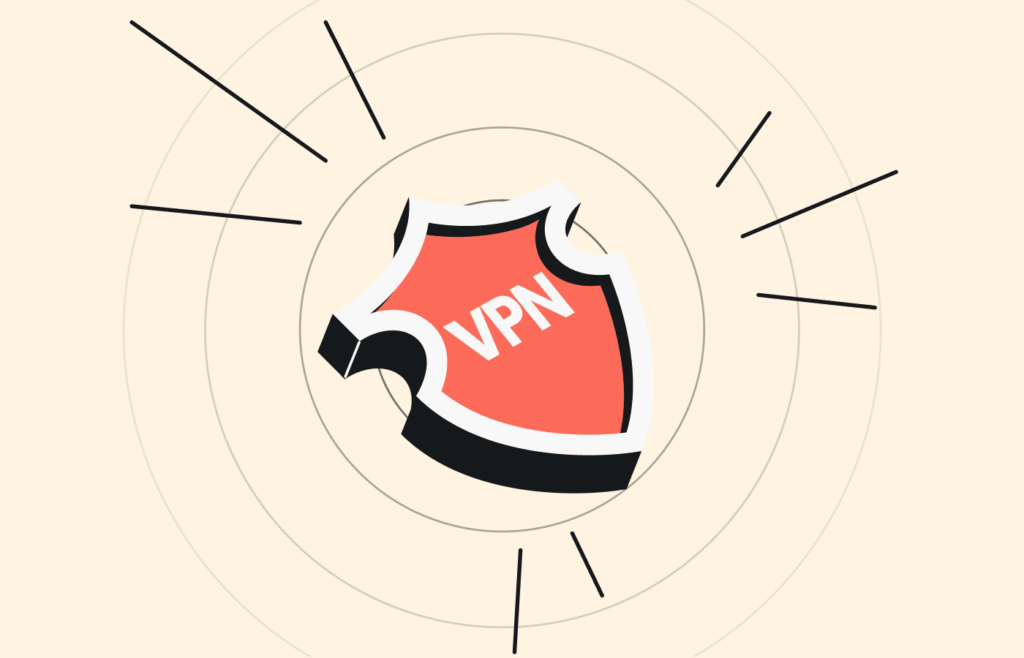
Having a reliable, high-quality VPN is an important step, but given the rising threats online, it is not the only step in a multi-layered approach to security.
Here are a few more concrete steps you can take to protect yourself online.
Step 1: Layering protection using a VPN and Tor
The Tor Browser provides great anonymity by routing your traffic through a collection of servers run by volunteers, but your Internet Service Provider (ISP) can still see that you are connecting to the Tor network.
In some countries, that fact alone could flag you. To solve that problem, appears in a layered way.
First, you can have a solid, reliable VPN encrypt your traffic, then you can open the Tor Browser. That’s it and that’s going to go a long way in protecting you.
It is a layer of obfuscation so that your ISP can no longer see that you are connecting to a Tor Network, and will only see an encrypted connection to a VPN server.
Step 2: Use dark web monitoring
Unlike waiting for a data breach to impact you, dark web monitoring offers an opportunity to take a proactive approach to cybersecurity. A dark web monitoring service examines dark web marketplaces and forums to identify if you’ve had your personally identifiable information (PII) leaked.
Dark web scanning provides an early warning alert that allows you to respond before cybercriminals can utilize your credentials. It is easy to enable services such as NordVPN’s Dark Web Monitor.
Step 3: Implement strong, unique passwords and multi-factor authentication (2FA)
The most common vulnerability exists with weak or reused passwords. As mentioned above, none of the security measures you take matter if the hacker has your login credentials from a prior data breach—even with a fully secured premium VPN.
Password managers can play an important role as they facilitate creating and securely storing unique, complex passwords that match each account.
We also recommend using two-factor authentication (2FA) for any services that have it.
It provides a second layer of verification, from either a code generated by a phone app or a biometric scan. 2FA makes it more difficult for hackers to access your account, even if they actually have your password.
Step 4: Be careful of downloads and clicks
The dark web and even the surface web have a lot of nefarious content, and it is very easy to acquire malware from an unauthorized website or an untrustworthy source of files.
We suggest being overly cautious with respect to what you download and click on.
Always have a strong anti-virus software up to date, and make sure that you keep your operating system and all of your applications up to date.
Ignoring updates is like locking the front door of your house and leaving a window or two open; it defeats the very purpose of having a secure setup.
FAQs
VPN security refers to the protection a VPN’s encrypted tunnel provides, which protects your data (and freedom) from hackers and ISPs by hiding your IP address. Your internet traffic passes through that secure connection to an IP address the VPN provider controls, hiding your true IP address behind the VPN server’s address.
A VPN can be very secure when you choose a provider that has garnered trust, stealth encryption, a kill switch, and a no-logs policy you can verify.
OpenVPN, WireGuard, and IKEv2/IPSec are the most secure protocols. They offer great security using encryption standards like AES-256 to ensure the confidentiality of data. OpenVPN is well-trusted; WireGuard is touted for speed and a new style with the modern design.
Free VPN are unsafe for doing any task online, as they lack advanced security features and come with several vulnerabilities. Moreover, they collect users’ data and then sell it to third parties to generate revenue. Therefore, if you still intend to use or are on a budget, we recommend using Proton VPN. It offers full-proof security even in the free version.
